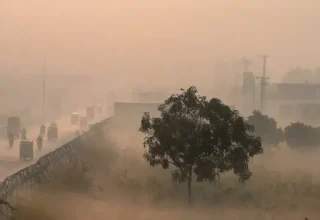
The Punjab government has stepped up efforts to tackle worsening air pollution with the launch of 38 air quality monitoring systems across the province. The decision was taken during a meeting of the Smog Steering Committee chaired by Senior Minister Maryam Aurangzeb.
Officials briefed the committee that 12 drone squads and eight “e-squads” have already been deployed, while a three-kilometer stretch along the motorways is being maintained as a smog-free zone.
The committee approved the use of “light codes” technology to signal dangerous smog levels. In case of severe alerts, educational institutions and business centers will be closed. Farmers will also be provided with modern machinery to replace the practice of burning crop residue.
The government decided to increase the number of “super seeders” to 5,000 and ensure machinery can be transported between districts. By October 31, all schools in Punjab must install color-coded waste bins.
A first-ever air quality calendar, covering September to December, has also been finalized. Maryam Aurangzeb directed that the number of air quality monitors be raised to 41 and that monitoring reports be released every eight hours. She also announced that vehicles failing to fix faulty engines after three fines would be taken off the road.
The committee further approved a new project called “liquid tree plantation,” a modern method to absorb pollution.
Maryam Aurangzeb said public awareness and citizen cooperation were vital for long-term improvement in environmental conditions, while media should play its role in spreading information.































